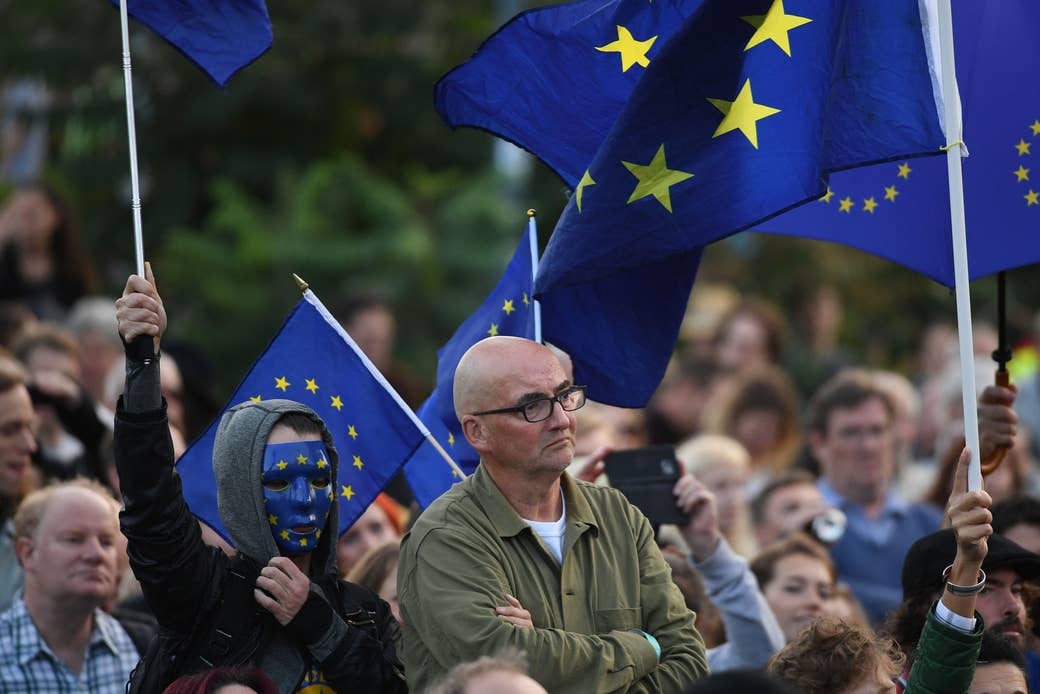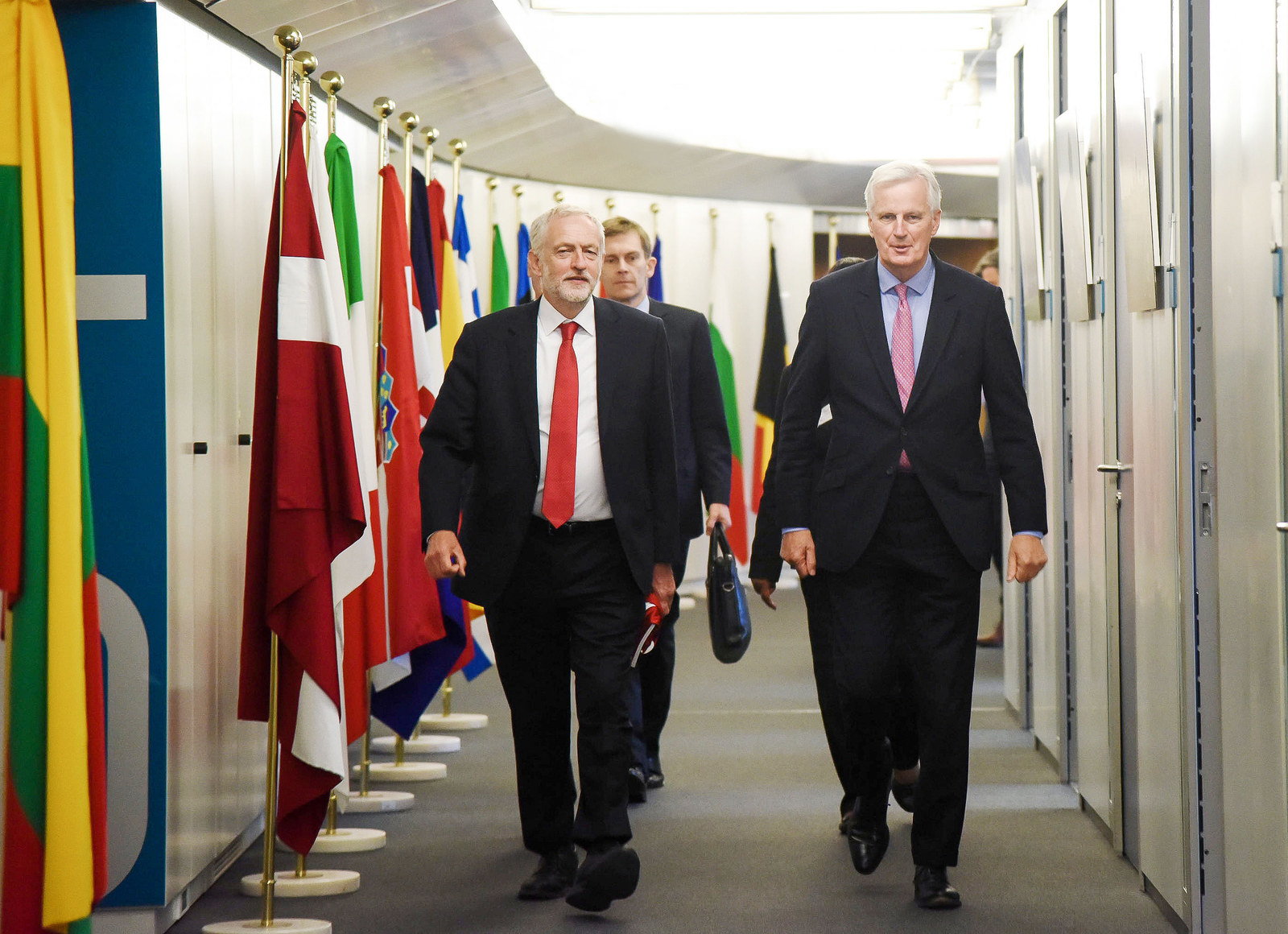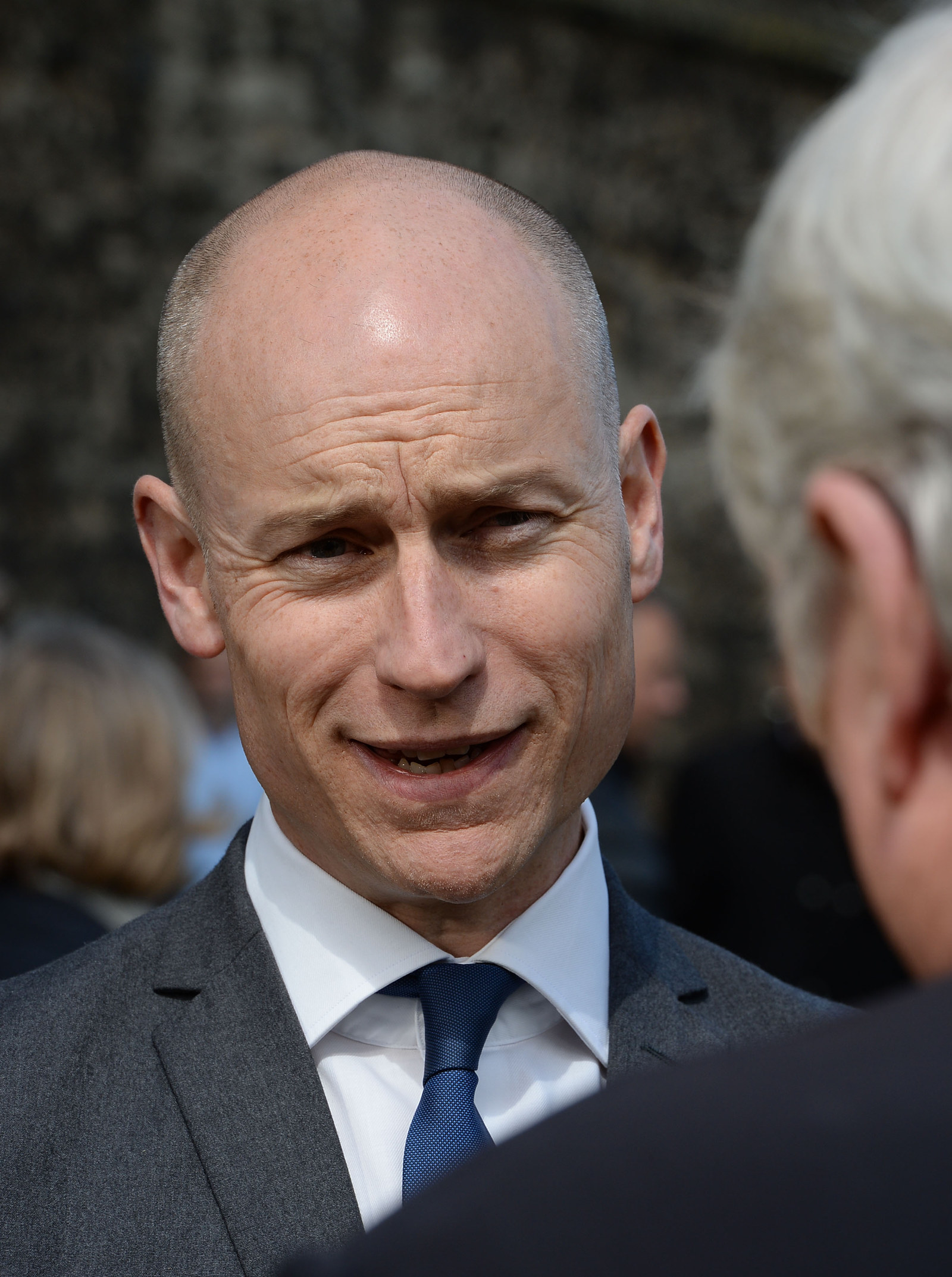
Outwardly, this was a good week for Labour on Brexit. The government finally started handing over the fabled impact studies after being outwitted by the opposition’s canny use of an arcane parliamentary procedure. Then Labour went on the attack over the rumoured £50 billion Brexit divorce bill, backed by furious Tory MPs, accusing ministers of weakness and obfuscation.
But drill down under the surface, deep where resentments stemming from the 2016 referendum are strong, and things aren’t quite so rosy in the Labour party. There is profound and growing frustration from a group of backbenchers over the party's direction of travel and the lack of a clear vision of Britain’s future relationship with the EU.
And there are fears that if the shadow cabinet doesn’t step up soon and put some clear water between Labour and the Tories on Brexit, it will have a tough time winning back power in any general election.
BuzzFeed News has been speaking to MPs, party staff, and campaigners to explore the tensions within Labour over the biggest challenge facing the country. Asking about Labour’s policy on Brexit often garners the same half-joking response: “When you find out, will you tell me?”
The party is clearly in a difficult position. On the one hand, it has vowed to honour the result of the 2016 referendum, which saw 52% of the country vote Leave and 48% Remain. But on the other, research suggests that the majority of Labour members want to see Britain stay in the single market and the customs union.
Labour also needs to satisfy the crowds of young voters who rushed to support its anti-establishment leader Jeremy Corbyn in the snap election earlier this year, many of whom would like to see the referendum result reversed altogether.
Just to make things even more problematic, Corbyn – who survived a coup attempt over his apparently lacklustre performance in the referendum campaign – has for decades made no secret of his Euroscepticism. That has resulted in serious trust issues in the parliamentary party, with one pro-Remain MP telling us: "There is a suspicion he voted Leave, and that is not easily forgotten."

Most MPs agree, however, that Labour’s decision in August this year to commit to Britain staying in the customs union and single market during a post-Brexit transition period was a game-changer.
The decision, agreed by the shadow cabinet at a specially convened meeting in summer recess, was widely interpreted as a sign that Labour was the party of “soft Brexit” and that set out a clear dividing line with the Tories for the first time.
But just a few weeks later, Theresa May announced the same thing in her Florence speech – calling for a two-year period after March 2019 during which Britain would continue to enjoy access to the single market and abide by EU rules.
Corbyn was quick to put out a press release saying the PM had “listened to Labour”. He said there was still a big difference between the two parties’ approach to Brexit – the Tories wanted to use it “to deregulate and cut taxes for the wealthy”, while Labour wanted a “jobs-first Brexit” to “invest and upgrade Britain’s economy”.
But there are concerns about what exactly this means. “Going round saying 'jobs-first Brexit' is silliness, and pretending austerity is not Brexit-related is also silliness,” said one Labour MP.
Many Labour backbenchers have been pushing the leadership to go further and commit to Britain staying in the single market – or at least some form of it – permanently after Brexit, for the sake of jobs and living standards. Yet they know that will be difficult to square with many voters, because it is linked to freedom of movement.
It is notable that the MPs most critical of Corbyn’s approach are former shadow ministers who either resigned over his performance in the referendum campaign or refused to serve under him in the first place.
Allies of Corbyn have dismissed their concerns as nothing more than “frustration” and “mischief-making”. One staffer claimed that the “vast majority of the PLP" (parliamentary Labour party) was behind the leadership on Brexit and that criticism was limited to just “a handful of people at the most”.
But it is hard to deny there is real anger and disquiet out there, not just from MPs but members and voters at large, that Labour is failing to set out its own path on Brexit – leaving it to the SNP, the Liberal Democrats, and Tory rebels to provide real opposition in the House of Commons.
"In the real world, Brexit is a massive issue," said one former shadow minister. "But you won’t hear Corbyn talking about it, [shadow chancellor John] McDonnell doesn't mention it at PLP meetings, they don’t mention it in speeches – it just doesn’t fit their ideological narrative.
"They don’t talk about it because then you can’t blame the Tory neoliberal for the faltering economy; Brexit is self-inflicted austerity."
Another Labour source blamed a "small phalanx" of people in the leader’s office who are "hell-bent" on leaving the EU. "They have convinced themselves that you can’t do their particular brand of socialism in the EU, which is fundamentally untrue,” they said.
Corbyn came under fire for failing to mention Brexit at Prime Minister’s Questions for weeks on end, leaving it to the SNP’s Westminster leader to point to the elephant in the room.
When Corbyn finally did ask May about it in late November, the PM turned the tables on him – pointing to a Commons debate on the customs union that saw Labour’s front bench side with the Tories, actively voting against their own backbenchers.

Meanwhile shadow Brexit secretary Sir Keir Starmer, the former director of public prosecutions, is in the middle of it all, trying his best to keep the peace. He is almost universally respected by Labour backbenchers, not least for his legal skills in decoding European legislation, but some are quick to point out that he is a relative novice when it comes to politics.
Starmer and Corbyn were absent for the vote that caused such a row within the party on 20 November, when former shadow Scotland secretary Ian Murray used an obscure amendment to a cross-border trade resolution that he claimed would keep Britain in the customs union after Brexit.
The EU’s customs union allows countries to club together and apply the same tariffs to goods from outside the union. It means that once goods have cleared customs in one country, they can be shipped to other EU nations without further tariffs being imposed.
The late-night debate saw numerous Labour and SNP MPs, plus Tory “Brexit mutineer” Anna Soubry, voice their backing for Murray’s amendment. But he wasn’t supported by his own front bench – so his plan was roundly defeated.
Labour backbenchers looked on in horror as Barry Gardiner, shadow international trade secretary, and McDonnell – along with 16 other Labour MPs – joined the Tories to vote against it. Some 28 Labour MPs, including former frontbenchers Heidi Alexander, Chris Bryant, Chris Leslie, Chuka Umunna, and Pat McFadden, backed the amendment.
The decision by the shadow cabinet to actively vote against Murray’s amendment, coupled with confusion over whether the vote was whipped, sparked fury on the back benches. "Barry Gardiner and John McDonnell went down the lobby with the Tories against the principle of the customs union,” one Labour MP told us.
“It’s ludicrous that our party leadership is averse to keeping the customs union on the table beyond transition.” Asked why they thought the party was averse to it, the MP said: "I suspect it’s because the leader and shadow chancellor are Brexiteers."
Gardiner later hit back at criticism on Twitter, saying the amendment was flawed and would in fact have done real damage to Britain’s trading ability in the future. But Labour MPs still demanded to know why frontbenchers didn’t put down their own amendments to back the principle of the customs union.
"All the rhetoric from both the government and opposition is to keep everything as close to what we’ve got at the moment, in order for it to be beneficial to the UK economy,” Murray told BuzzFeed News.
"Therefore the fact they’ve taken the single market and customs union off the table doesn’t make sense. That night was an opportunity to stand up for the customs union and neither the government or the opposition did that. And that’s to the detriment of the UK, in my view."
One source close to Corbyn and McDonnell said it was “preposterous” to say the pair were pro-Brexit, insisting they had campaigned hard for Remain and were now fighting hard against a “damaging" Tory Brexit.
"The amendment [from Murray] was very sloppy and actually would have undermined any sort of negotiation on staying in the customs union, and that’s why we didn’t support it," they said. "We want the greatest possible frictionless access to the single market and we want access to a customs union. That seems quite clear to me."
Faced with mounting criticism over the party’s position following the vote last week, Starmer wrote an article for LabourList seeking to reassure MPs that he had not swept any "options off the table".
"On the contrary, subject of course to negotiations, remaining in a customs union with the EU is a viable long-term option for Labour," he said. "Equally, we are flexible as to whether the benefits of the single market are best retained in the long term by negotiating a new single market relationship or by working up from a bespoke trade deal."

But it has not been enough to convince some. Labour MP Stephen Kinnock has long been calling for Britain to move into the European Economic Area, which is conjoined with the single market but free from the direct jurisdiction of the European Court of Justice, and is often lobbying Starmer and his deputy Matthew Pennycock on the issue.
Kinnock said: "It’s great that we say we want a jobs-first Brexit – but how? And until we’ve set out the how, so people say 'yep, I get that, I see how it works', then I think it will be difficult to get right on to the front foot in terms of our role both as opposition and as a future government.
"I think that’s the challenge we have – we’re doing a fantastic job of holding the government’s feet to the fire, pointing out where they’re failing so badly to represent our national interest in the best possible way in these negotiations, but we’re not, so far, coming forward with a long-term vision with what we think our future relationship with the European Union should be."
Labour’s victory this week in finally forcing the government to start handing over supposedly secret reports into the potential impact of Brexit on the economy was a welcome boost for frustrated backbenchers. Whether or not the reports turn out to contain much information – and it is widely thought they won’t – it's hard to deny Labour is succeeding in holding Brexit secretary David Davis to account.
The party also used an urgent question on Wednesday to demand information from the government over the Brexit divorce settlement, which is expected to cost the UK more than £50 billion. In a move that caught the government off guard, Labour tabled an amendment to the EU withdrawal bill requiring the cost to be assessed by two financial watchdogs, and for MPs to be given a vote on it.
But Kinnock urged his party to go further: "Opposition is always about two things – holding the government’s feet to the fire and calling them out, but also being a government in waiting. And that means setting out your own vision, your own plan.
"We had a great manifesto on June 8 setting out a plan – we now need to step up to the plate and do the same on Brexit and that vision for a future relationship."
The lack of trust from pro-Remain backbenchers towards the Labour leadership over Brexit has roots in the EU referendum. “If Jeremy had fought just 20% harder, we would have had a different result,” one pro-Remain MP said. “The Tories were counting on Labour to do their part and he failed to step up."
Corbyn is now being pulled in two directions – between his Eurosceptic comrades of old and the swaths of young followers who backed him in the snap election. He also faces pressure from his trade union allies, who are desperate to protect jobs in the manufacturing, finance, and service industries, to pledge to stay in the single market long-term.
Richard Angell, director of centrist campaign group Progress, said: "What seems interesting to me is that Labour backbenchers – many of whom got a dividend at the election because young people turned out – have internalised that those young people as much as anything wanted them to stop a hard Brexit, and are trying to do what they can to honour those people who turned out for the first time.
"But the front bench have taken all the wrong conclusions from those young people turning up; they're thinking it was somehow about a transactional deal on tuition fees rather than a generational demand for their jobs and opportunities back. And the right thing to bring people together is to find a way to leave the EU and stay in the single market and customs union."
Other Labour voices, however, caution against assuming that all young people who voted for Corbyn are pro-Brussels. “This was a kick against the system,” one party staffer said of the snap election. “These voters hate elites in all forms: whether it's the Tory prime minister, whether it's the EU. Corbyn is the antidote to that.”
Labour will step up its attacks on the Tories' handling of Brexit ahead of the crunch European Council on 14 December, which will determine whether enough progress has been made in negotiations to allow Brexit talks to move on to trade and transition.
Starmer has dramatically given the PM "two weeks to save herself, save Brexit and save the economy". But MPs say criticism of Tory policy simply isn't enough.
And they warn that as time inexorably marches on towards the March 2019 exit date, splits within the party will only become deeper and starker unless Labour sets out a path on Brexit that is markedly different to that of the government.
